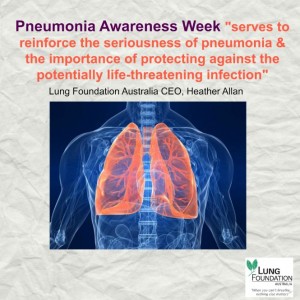Carole, 70 – Gardener, quilter, mother & grandmother who survived a devastating episode of pneumonia, MELBOURNE – May 12, 2016
Gardener, quilter, mother-to-three and grandmother-to-six, Carole, 70, Melbourne contracted a nasty virus while holidaying in Scotland during August, 2015. She spent the last week of her holiday bed-ridden, in excruciating pain, in a Scottish hospital, before returning home in September, 2015, still feeling unwell.
After failing to make any substantial improvement to her health, Carole visited her local doctor, who subsequently performed various X-rays and sputum tests, and diagnosed her with meningococcal pneumonia in both lungs.
Carole spent the ensuing three weeks in hospital, and the remainder of 2015 plagued by various respiratory problems, which saw her travel in and out of hospital.
She is now a strong advocate for pneumococcal vaccination.
This is Carole’s story.
“I was exhausted, and felt extremely nauseous, to the extent that I couldn’t get out of bed,” said Carole.
“I was generally unwell, and knew I had developed more than just a cold, so I decided to visit the doctor.
“I was travelling around Scotland during July and August, 2015, when I contracted a virus, and spent the final week of my holiday in a Scottish hospital before returning to Australia,” Carole said.
When Carole arrived home, still feeling off-colour, she soon contracted another infection, which left her completely “spent, nauseous and bed-ridden.” Once again, Carole visited her local doctor for professional advice, who coordinated some chest scans and X-rays, along with some sputum tests, and diagnosed her with meningococcal pneumonia.
Post- diagnosis, Carole was once again, hospitalised, where she spent the ensuing three weeks mounting a recovery from pneumonia.
“According to my doctors, the infection that I contracted in Scotland weakened my immune system, which heightened my susceptibility to pneumonia,” Carole said.
“Personally, I found it very debilitating to be in hospital for three weeks. It was also really hard on my husband, who had to come and visit me every day, armed with all sorts of things that I required.”
Carole battled extreme pain throughout her episode of pneumonia, but heeded her doctors’ advice on how to mount the best recovery from the often fatal infection.
“I never knew just how much pain was associated with pneumonia, until I experienced the infection first-hand.
“But despite being overwhelmed with pain, particularly at the start of the infection, I had a good doctor in whom I placed my trust, and knew that I would be okay, when he reassured me of such,” said Carole.
When Carole returned home in September, 2015, she was plagued by ongoing respiratory problems, from which she spent the next few months in and out of hospital.
At Christmas last year, her respiratory problems finally resolved.
Before contracting pneumonia, Carole was unaware that her age alone (65+), placed her at risk of contracting pneumonia, including pneumococcal pneumonia.
“I had no idea that 65 years olds were considered at-risk of contracting pneumococcal pneumonia, and subsequently qualified for a free pneumococcal vaccine,” Carole said.
Carole had her first, free pneumococcal vaccination in 2014, and was then advised that she would qualify for her next vaccination in five years’ time.
“I had the pneumococcal pneumonia vaccination because of my age. My doctor informed me about it, and recommended it to me, so I chose to have it.
“I try to eat well, and to exercise, and believe regular visits to the doctor and age-appropriate vaccinations are key to maintaining good health,” said Carole.
“It’s important for people my age to maintain their health and fitness, because that gives us the freedom to do the things in life that we want to do.”
Given her first-hand experience with pneumonia, Carole is a strong advocate for pneumococcal vaccination, and urges all Australians aged 65 and above, and others who qualify for the pneumococcal vaccine for different reasons, to protect against the often fatal lung infection.
“My advice to any Australian turning 65 or over, or to anyone who is immunocompromised, or qualifies for the free pneumococcal vaccine, is to talk to your doctor about how to best protect against the infection, including vaccination.
“It’s important to look after your health, and that includes vaccinating against vaccine-preventable infections, such as pneumococcal pneumonia,” Carole said.

